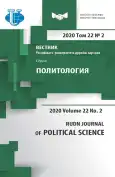China’s “Gold Shield”: Monemonic Internet Practice Management Policy
- Authors: Podshibyakina T.A.1
-
Affiliations:
- Southern Federal University
- Issue: Vol 22, No 2 (2020)
- Pages: 194-204
- Section: GLOBAL DISCURSIVE CONFRONTATION
- URL: https://journal-vniispk.ru/2313-1438/article/view/322156
- DOI: https://doi.org/10.22363/2313-1438-2020-22-2-194-204
- ID: 322156
Cite item
Full Text
Abstract
Actualization of the past is a natural manifestation of need for reflection of historical memory for society; it also pushes elites to search for new forms of “mental control” over public consciousness. The research is devoted to the problem of keeping historical memory in the context of censorship on the Internet. The goal is to identify the symbolic effects of historical memory that arises as a result of narrative representations of history and cognitive mnemonic practices of network media and online Internet communities in the context of censorship. Result of this research was conceptualization of the notion for “cognitive mnemonic Internet practices”, their typology in accordance with the types of cognitive censorship of network media and a description of their symbolic effects. Concept of the Internet as a mnemonic system is theoretically grounded, a typology of censorship strategies is given as a factor affecting the displacement of some forms of historical memory from the public sphere of society and their expression in various network mnemonic practices. The case study analysis of modern Chinese network media allowed for conceptualization of the notion of “cognitive mnemonic Internet practices” and grounding the conclusions.
About the authors
Tat’yana A. Podshibyakina
Southern Federal University
Author for correspondence.
Email: tan5@bk.ru
PhD in Political Science, Associate Professor of Department of Theoretical and Applied Political Science at the Institute of Philosophy and Social & Political Sciences
105/42 Bolshaya Sadovaya St, Rostov-on-Don, 344006, Russian FederationReferences
- Leksyutina Y.V. American-Chinese dialogue on the development and government regulation of the global Internet. Bulletin of St. Petersburg University. Series 6. Political science. International relationships. 2011; 2: 67–76. (In Russ.).
- King G., Pan J., Roberts M.E. How the Chinese government fabricates social media posts for strategic distraction, not engaged argument. American political science review. 2017; 111 (3): 484–501.
- Cheng Y., Lee C.J. Online crisis communication in a post-truth Chinese society: Evidence from interdisciplinary literature. Public Relations Review. 2019. DOI: https://doi.org/ 10.1016/j.pubrev.2019.101826
- Leksyutina Y.V. Policy of the Chinese leadership in matters of control and regulation of the Internet. Society and State in China. 2015; 17–1: 28–37. (In Russ.).
- Semenova N.K. Non-governmental organizations of the PRC are the sprouts of democracy. Xinghai revolution and Republican China – the century of revolutions, evolution and modernization. Digest of articles. M.: Institute of Oriental Studies, Russian Academy of Sciences, 2013: 209–222. (In Russ.).
- Ganshin V.G. The role of the Internet in the process of forming civil society in China. Problems of the Far East. 2010; 4: 84–92. (In Russ.).
- Han E.L. Journalism and mnemonic practices in Chinese social media: Remembering catastrophic events on Weibo. Memory Studies. 2017. DOI: https://doi.org/10.1177/ 1750698017714833
- Wang Y. Contesting the past on the Chinese Internet: Han-centrism and mnemonic practices. Memory Studies. 2019. DOI: https://doi.org/10.1177/1750698019875996
- Gustafsson K. Chinese collective memory on the Internet: Remembering the Great Famine in online encyclopaedias. Memory Studies. 2019; 12 (2): 184–197.
- Wu X. Discursive strategies of resistance on Weibo: A case study of the 2015 Tianjin explosions in China. Discourse, Context & Media. 2018; 26: 64–73.
- Li H.S. Spoof Videos: Entertainment and Alternative Memory in China. Entertainment Values. Palgrave Macmillan, London, 2017: 179–194.
- Li H.S. Narrative dissidence, spoof videos and alternative memory in China. International Journal of Cultural Studies. 2016; 19 (5): 501–517.
- Zhao H., Liu J. Social Media and Collective Remembrance. The debate over China’s Great Famine on weibo. China Perspectives. 2015; 2015 (2015/1): 41–48.
- Liu J. Who Speaks for the Past? Social Media, Social Memory, and the Production of Historical Knowledge in Contemporary China. International Journal of Communication. 2018; 12: 21.
- Cao X. Censorship and Everyday Forms of Resistance in Chinese Cyberspace. ResearchSpace@ Auckland 2015. URL: https://researchspace.auckland.ac.nz/handle/ 2292/28131. Accessed: 29.12.2020.
- Giese K. Speaker’s corner or virtual panopticon: Discursive construction of Chinese identities online. Cyber China. Palgrave Macmillan, New York, 2004: 19–36.
- Mengin F. Cyber China: Reshaping National Identities in the Ages of Information. New York: Palgrave Macmillan, 2004: 260.
- Cui D., Wu F. Moral goodness and social orderliness: An analysis of the official media discourse about Internet governance in China. Telecommunications Policy. 2016; 40 (2–3): 265–276.
- Nordin A., Richaud L. Subverting official language and discourse in China? Type river crab for harmony. China Information. 2014; 28 (1): 47–67. doi: 10.1177/0920203X14524687
- Tang L., Yang P. Symbolic power and the internet: The power of a ‘horse.’ Media, Culture & Society. 2011; 33 (5): 675–691. DOI: https://doi.org/10.1177/0163443711404462
- Meng B. From Steamed Bun to Grass Mud Horse: E Gao as alternative political discourse on the Chinese Internet. Global Media and Communication. 2011; 7 (1): 33–51. DOI: https://doi.org/10.1177/1742766510397938
- Schmidt L., de Kloet J. Bricolage: Role of Media. The International Encyclopedia of Media Effects. 2017: 1–9.
- Yang F. Rethinking China’s Internet censorship: The practice of recoding and the politics of visibility. New Media & Society. 2016; 18 (7): 1364–1381. DOI: https://doi.org/10.1177/ 1461444814555951
Supplementary files









